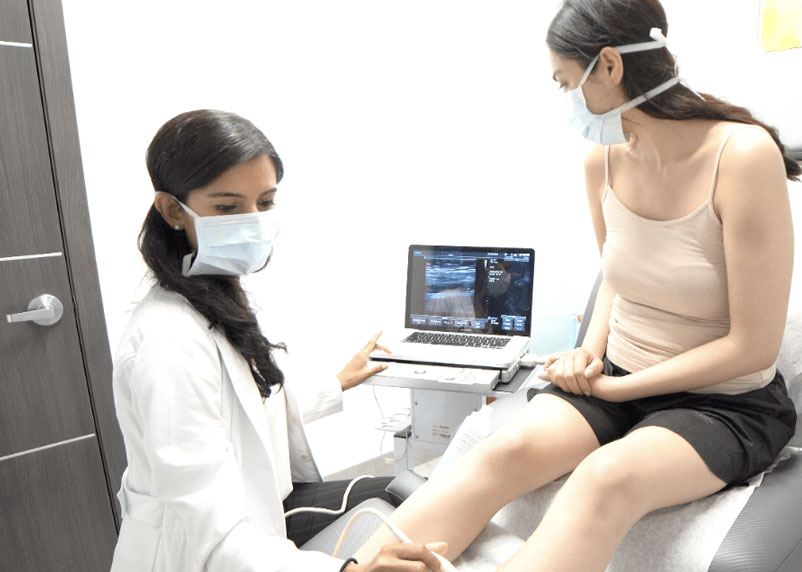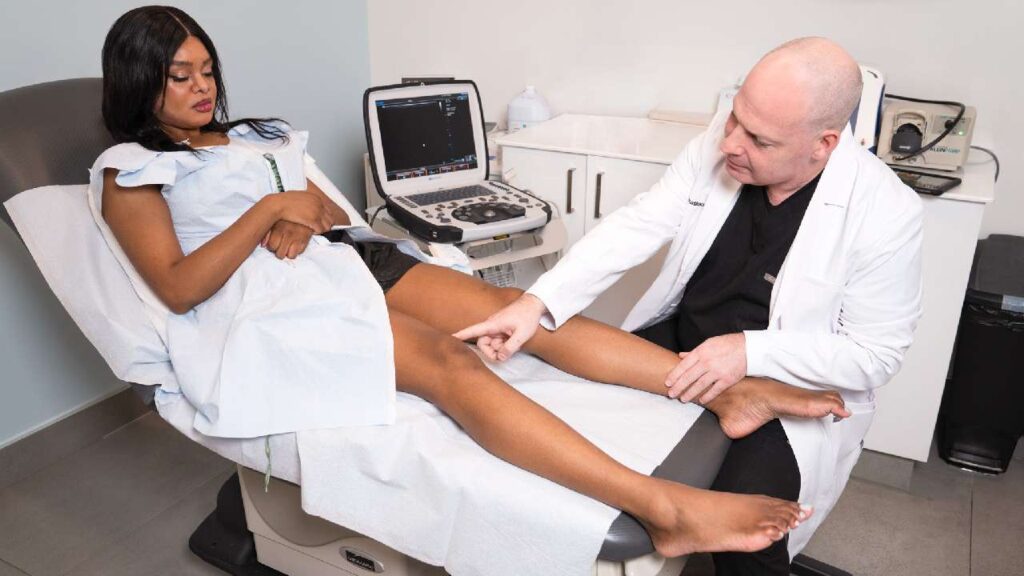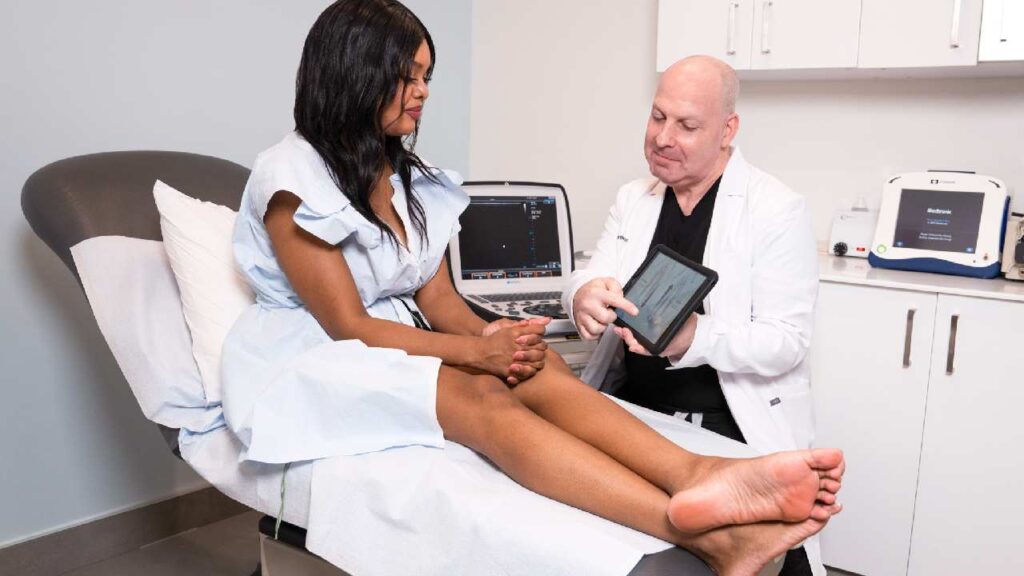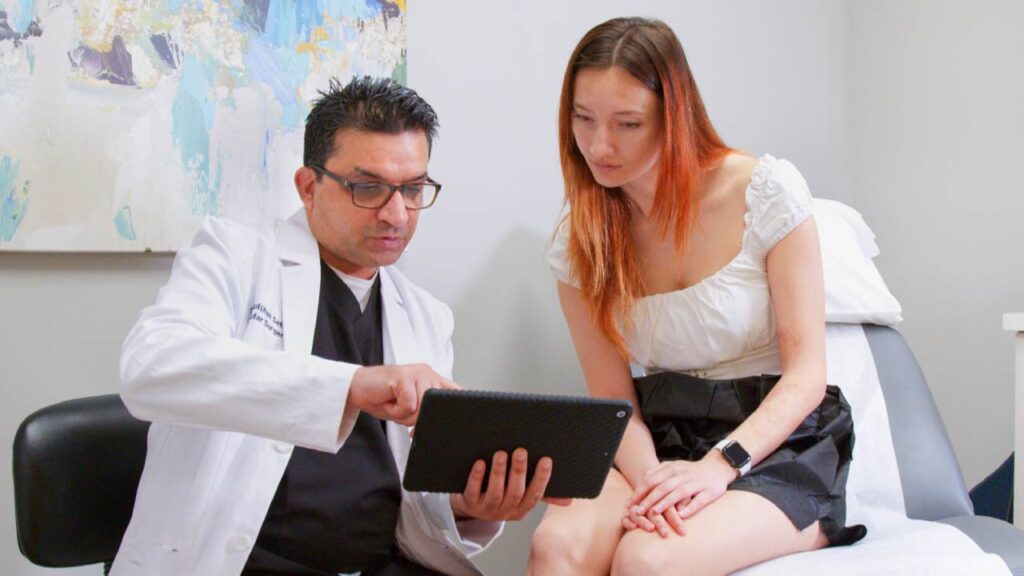What Causes Pregnancy Leg Veins to Become Varicose?
Varicose veins are common in women. Pregnancy introduces several factors that increase the incidence of varicose veins, so they’re especially common in pregnant women. Varicose veins result from excess pressure in a vein when a venous valve fails and allows blood to flow in reverse. For some patients, varicosities cause a host of symptoms. For other patients, they remain asymptomatic.
Book an appointment with a Harvard-trained vein doctor in New York to assess your varicose veins in pregnancy. While some aren’t problematic, others pose serious risks you’ll learn more about below. Here are three reasons pregnancy causes venous valve failure and varicose veins.
- The expanding uterus puts pressure on pelvic veins, causing them to become engorged.
- Pregnancy doubles blood volume, which stretches veins and makes it harder for vein valves to close. As blood leaks in reverse, pressure generates varicose veins.
- An increase in the hormone progesterone relaxes vein walls, which increases valve failure and venous reflux.

What’s the Connection Between Veins, Pregnancy, and Legs?
When blood volume doubles during pregnancy, veins stretch to contain the excess. Veins are lined with valves that must close once blood passes through to keep blood flowing upward. When blood vessels expand, the valves don’t close tightly. Blood leaks backward through the vein and accumulates beneath the valve. This causes pressure to build, which makes the vein swell and twist into a varicose vein.
Doubled blood volume, extra progesterone, and pressure on veins from the uterus all make it harder for valves to close. As a result, pregnant women often develop venous reflux, or backward blood flow, which creates varicose veins. The reason varicose veins are so common in the legs is that leg veins must return blood to the heart from the feet. They already have an uphill battle against gravity, so pregnancy’s impact makes leg veins more susceptible to valve failure.
Is the Impact of Pregnancy on Veins in Legs Dangerous?
Since blood volume reduces after delivery, some patients’ varicose veins will shrink back to a normal size. Varicose veins aren’t always dangerous. However, some people develop complications like venous ulcerations, blood clots, and profuse bleeding. Since valve failure and vein disease start in deep veins, it’s important to have a qualified vein doctor assess your varicose veins.
Our Harvard-trained vein doctors in NY use tools like Duplex or Doppler Ultrasound to find the source of your vein damage and any potential complications. With the latest vein technology, patients don’t have to wonder if their varicose veins are dangerous. Our award-winning vein clinics have all the tools to safely assess your vascular health during pregnancy.
Do Pregnancy Veins on Legs Require Treatment?
Some patients’ veins will improve after pregnancy, but many patients’ varicose veins remain. This is particularly true if the patient has Chronic Venous Insufficiency. Varicose veins in pregnancy are more likely to shrink if they were caused by pressure on the uterus, not valve failure or vein disease.
In addition, varicose veins and Chronic Venous Insufficiency run in families, so some women develop them simultaneously with pregnancy, not directly because of it. These varicosities might also remain post pregnancy. Treatment for some patients is medically necessary, while it’s elective for other patients. Most insurance companies now cover varicose vein treatment, since varicose veins are proven to impact quality of life with symptoms like leg swelling, cramping, heaviness, restlessness, and itching.
Should You Treat Veins in Legs in Pregnancy?
It’s best to wait until after pregnancy to treat varicose veins. Most patients will need a minimally invasive injection of a sclerosant or adhesive, or an application of thermal energy to close the vein. Since the fetus is supplied by the mother’s veins, treatment is recommended for after delivery. See a vein doctor now to make sure treatment is not urgent. If not, they’ll schedule you for when your ObGyn approves treatment.
Until you are cleared for treatment, a vein doctor can advise you how to manage symptoms of varicose veins in pregnancy. These tactics include not sitting or standing for long periods and flexing your calf muscles if you have to be stationary. They might also tell you not to cross your legs too often and to elevate your legs while at rest.
When Pregnant, Are Veins in Legs the Only Concern?
Leg veins are not the only blood vessels impacted by pregnancy. All of the lower extremities are more susceptible to valve failure and varicose veins while pregnant, including the groin area, pelvic region, labia, buttocks, rectum, ankles, and feet. The same excess pressure is applied to these areas during pregnancy, due to weight gain, the expanding uterus, hormonal shifts, and increased blood volume. If you develop a varicose vein on any area of your body while pregnant, it’s likely correlated. See a vein doctor to determine the urgency of your varicosity.
Are Varicose Veins on Labia Linked to Pregnancy?
Vulvar varicose veins or varicose veins on the labia are common during pregnancy. Not only is there extra blood flowing through the circulatory system, but there is also added pressure on your pelvic veins as the fetus grows and stretches the uterus. When blood pools in vulvar veins, it causes varicosities. Varicose veins on the labia are particularly common in the third trimester when the uterus is largest.
How Does Pregnancy Cause a Varicose Vein in Labia?
What causes varicose veins during pregnancy on the labia? Pregnancy affects these veins the same way it affects veins in the legs. In addition, the act of labor puts pressure on labial veins, and it’s common for women to develop vein damage from the exertion of childbirth. Some women also develop spider veins and broken capillaries in areas like their face, in addition to the lower extremities from pushing during delivery.
Do Labia Varicose Veins Go Away After Pregnancy?
Labial varicose veins, like varicose veins in the legs, might improve after delivery. But for many women, they only shrink and don’t disappear. The more pregnancies you have, the more likely it is that the varicose veins will persist. If you have Chronic Venous Insufficiency, you might develop more varicose veins over time. See a vein specialist if you’re unhappy with your labia varicose veins. Treatment is quick, gentle, and outpatient, and it restores your self-confidence, along with your vascular health.
Do Labial Varicose Veins Require Treatment?
For some patients, treatment is necessary. This includes patients whose veins bleed easily, or who have blood clots or ulcerations that are slow to heal. Varicose veins can cause debilitating symptoms but they’re easy to treat, if you choose a qualified vein doctor. At our award-winning vein clinics in NY, spider veins and varicose veins are treated in 15-30 minutes. Patients need no recovery time and can head back to work or their parenting duties immediately after treatment. If you have post-pregnancy labial varicose veins, book an appointment with our exceptional vascular specialists today.
Are Swollen Veins on Buttocks or Rectum Caused by Pregnancy?
Rectal veins or buttock veins are also prone to becoming varicose while pregnant. They experience the same expansion and pressure changes, and also the pressure of exertion during delivery. They are also impacted by a common symptom of pregnancy– constipation. When patients strain for a bowel movement, they often develop a rectal varicose vein, which is called a hemorrhoid.
What Is the Cause of My Varicose Veins in Pregnancy?
As mentioned, there are several varicose vein causes during pregnancy. They are all related to elevated pressure in blood vessels, but the impetus for that pressure varies by patient. Visit our vein clinic if you are concerned about swollen veins anywhere on your body during pregnancy. Our board certified vein doctors have decades of experience determining what is the cause of each patient’s vein damage. Visit our renowned vein clinic in Midtown Manhattan or the Financial District for rapid relief from pregnancy-related varicose veins.





